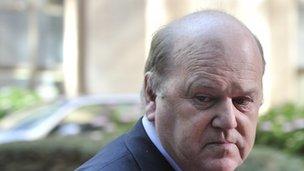Republic must save 12.4bn euros over next four years
- Published

Finance Minister Michael Noonan said the budget would be hard but there was a clear way forward.
Savings of 12.4bn euros will need to be found by the Irish government over the next four years if the Republic is to meet its financial targets.
The Republic must bring its deficit below 3% of economic output, as dictated by the EU and International Monetary Fund.
Of that, 7.75bn euros will be made up of spending cuts, with 4.65bn euros in additional tax measures.
The Republic's Medium Term Fiscal Statement was published on Friday.
It is designed to show the markets how Ireland will reduce its deficit and to give certainty to consumers about what lies ahead.
The plan lowers the 2012 growth projection to just 1.6% versus previous expectations of 2.5%. Growth forecasts for 2013 to 2015 also have been moderately reduced.
Ireland's Finance Minister Michael Noonan said the 2012 cuts to be detailed in his forthcoming budget on 6 December will involve 1.6bn euros in tax increases and 2.2bn euros in spending cuts.
"With the information we have at the moment we think we can do this without touching income tax in 2012, and going forward, we are fairly certain we won't have to touch rates, bands or credits," he said.
Referring to the 8.6% debt-to-gross domestic product target for 2012 as "sacrosanct", Mr Noonan also acknowledged the fallout from the austerity measures.
"These cuts are real, one person's cut is another person's public service, so we are not making light of this.
"This budget is going to be hard on people and we are asking the people to stay with us because we have a clear plan for getting the country out of the difficulty that it is in, and the essential elements of that plan are to get the economy growing again and get people back to work."
He also revealed that VAT, excise duties and carbon taxes are being reviewed as a way of increasing tax revenues.
"We are committed to a balanced programme to get growth back into the economy, a programme to get our sovereignty back, a programme to get people back to work through growth and that will be the most difficult element and we acknowledge that openly."